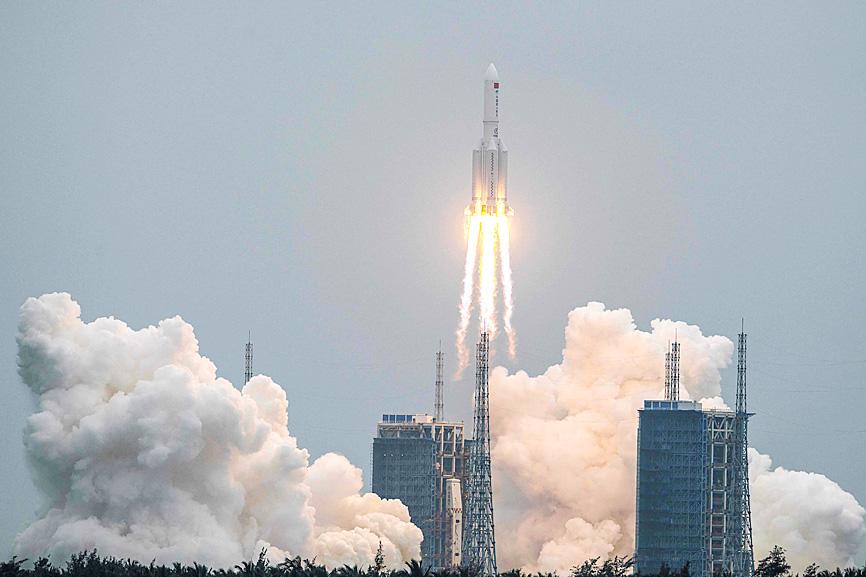China yesterday launched the first module of its “Heavenly Palace” space station, a breakthrough in Beijing’s ambitious plan to establish a permanent human presence in space.
Billions of dollars have been poured into space exploration, as China seeks to reflect its rising global stature and growing technological might, following in the footsteps of the US, Russia and Europe.
The Tianhe core module, which houses life support equipment and a living space for astronauts, was yesterday launched from the Wenchang Space Launch Center in Hainan Province on a Long March 5B rocket, China Central Television (CCTV) showed.

Photo: AFP
Chinese President Xi Jinping (習近平) called the space station a key step in “building a great nation of science and technology.”
The Tiangong, or “Heavenly Palace,” space station is expected to be operational by next year after about 11 missions to deliver more modules and assemble them in orbit.
Live footage from CCTV showed space program employees cheering as the rocket powered its way through the atmosphere, billowing flames from the launch site.
Crowds wearing sunhats and wielding smartphone cameras gathered under the coconut trees of a nearby beach to watch the launch, as a band played in photographs published by the China Aerospace Science and Technology Corp.
“A palace in the sky will no longer be just a romantic fantasy of the ancients,” the CCTV anchor said.
The completed station is to be similar to the Soviet “Mir” station that orbited Earth from the 1980s until 2001.
The Chinese space station is expected to remain in low orbit at 400km to 450km above Earth for a lifespan of about 15 years.
The completed station, weighing little more than 82 tonnes, would be about one-quarter the size of the International Space Station.
The station is to have two other modules for scientific study and be equipped with solar panels, as well as experimental equipment — including an ultra-cold atomic experiment apparatus, the Chinese Society of Astronautics said.
The core module would give three astronauts 50m3 of living space, equipped with advanced telecommunications equipment that would allow astronauts to even browse Web sites.
China launched the Tiangong-1 lab, its first prototype module intended to lay the groundwork for a permanently crewed station, in September 2011.
A second lab, Tiangong-2, was launched into orbit in 2016.
The country has come a long way since its first satellite in 1970.

A new online voting system aimed at boosting turnout among the Philippines’ millions of overseas workers ahead of Monday’s mid-term elections has been marked by confusion and fears of disenfranchisement. Thousands of overseas Filipino workers have already cast their ballots in the race dominated by a bitter feud between President Ferdinand Marcos Jr and his impeached vice president, Sara Duterte. While official turnout figures are not yet publicly available, data from the Philippine Commission on Elections (COMELEC) showed that at least 134,000 of the 1.22 million registered overseas voters have signed up for the new online system, which opened on April 13. However,

ENTERTAINMENT: Rio officials have a history of organizing massive concerts on Copacabana Beach, with Madonna’s show drawing about 1.6 million fans last year Lady Gaga on Saturday night gave a free concert in front of 2 million fans who poured onto Copacabana Beach in Rio de Janeiro for the biggest show of her career. “Tonight, we’re making history... Thank you for making history with me,” Lady Gaga told a screaming crowd. The Mother Monster, as she is known, started the show at about 10:10pm local time with her 2011 song Bloody Mary. Cries of joy rose from the tightly packed fans who sang and danced shoulder-to-shoulder on the vast stretch of sand. Concert organizers said 2.1 million people attended the show. Lady Gaga

CONFLICTING REPORTS: Beijing said it was ‘not familiar with the matter’ when asked if Chinese jets were used in the conflict, after Pakistan’s foreign minister said they were The Pakistan Army yesterday said it shot down 25 Indian drones, a day after the worst violence between the nuclear-armed rivals in two decades. Pakistani Prime Minister Shehbaz Sharif vowed to retaliate after India launched deadly missile strikes on Wednesday morning, escalating days of gunfire along their border. At least 45 deaths were reported from both sides following Wednesday’s violence, including children. Pakistan’s military said in a statement yesterday that it had “so far shot down 25 Israeli-made Harop drones” at multiple location across the country. “Last night, India showed another act of aggression by sending drones to multiple locations,” Pakistan military spokesman Ahmed

SUPPORT: The Australian prime minister promised to back Kyiv against Russia’s invasion, saying: ‘That’s my government’s position. It was yesterday. It still is’ Left-leaning Australian Prime Minister Anthony Albanese yesterday basked in his landslide election win, promising a “disciplined, orderly” government to confront cost-of-living pain and tariff turmoil. People clapped as the 62-year-old and his fiancee, Jodie Haydon, who visited his old inner Sydney haunt, Cafe Italia, surrounded by a crowd of jostling photographers and journalists. Albanese’s Labor Party is on course to win at least 83 seats in the 150-member parliament, partial results showed. Opposition leader Peter Dutton’s conservative Liberal-National coalition had just 38 seats, and other parties 12. Another 17 seats were still in doubt. “We will be a disciplined, orderly